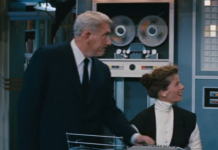Here are two more documents from yesterday’s first sale hearing. Like yesterday’s pair, they’re a half-and-half split: one in favor of expanding first sale, the other concerned over what the implications might be. We begin with the concerned one.
Graphic Artists Guild
Writing on behalf of the Graphic Artists Guild, Ed Shems explains graphic artist concerns over the possible expansion of fair use in a 5-page PDF. Graphic artists, Shems explains, frequently license their work rather than selling it outright. This allows them to tailor their fees to a client’s needs and not have to charge more than the client can afford for uses the client doesn’t need.
Shems expresses concern over the possibility of first sale’s expansion to digital goods, and also over a related issue he had heard the subcommittee was considering: “whether artists and other copyright owners should be able to write the terms of our license agreements with our clients based upon their actual needs without being subject to government regulation.”
That’s an interesting spin on things. I know there had been concern over shrinkwrap licenses and the effect they have on first sale (most notably concerning the Autodesk case) but hadn’t expected that to affect ordinary license agreements for creative works. But Shems is concerned that it might.
Shems’s objections to digital first sale are essentially the same as Wiley’s: digital goods don’t degrade over time, and “used” digital goods resales, as for e-books, would adversely affect his clients who use his artwork in their books.
Additionally, under the proposed change, I am concerned that because infringement will become even harder to police than it is now, once my artwork has been published, my work may then be altered by an end user in a manner to which I may object. This may include reworking of the art in an objectionable way or using it to promote or convey a message with which I do not agree. My artwork represents me and my point of view and changes unapproved by me might impact negatively upon my reputation and therefore my ability to attract work/clients. As a creative professional and small business owner, I am able to choose which clients I work with. Under an extension of the first sale doctrine, where copies of my work could be digitally sold to others I don’t know or work with, that right would be taken away from me.
He also notes that digital first sale is not something visual artists’ clients have been asking for either.
In regard to the issue of government regulation of license agreements, Shems holds that restriction of artists’ ability to license work to their clients will cause them to have to sell that work outright instead, and thus necessarily price their work out of range of potential clients who previously could just license that work on favorable terms, with price and payment options customized to meet those clients’ needs and ability to pay.
I’m not sure this is an entirely realistic concern, but nonetheless it’s interesting to hear how the question of first sale affects people outside the range of stakeholders who usually get all the attention when the first sale question comes up.
Owners’ Rights Initiative
The next stakeholder to have his say is Jonathan Band, counsel for the Owners’ Rights Initiative. ORI is an association of over twenty companies and trade organizations. These include library associations such as the ALA, Goodwill Industries International, and a number of e-tailers such as eBay, Etsy, Overstock.com, Powell’s Books, and Redbox. (We previously covered the Owners’ Rights Initiative here.) The ORI, Band explains, formed while the Kirtsaeng vs. Wiley case was pending before the Supreme Court, and has the goal of protecting and fostering first sale principles. (Given how many of its members deal with reselling used merchandise, it’s not surprising.)
This 15-page PDF reads in part like a mirror image of the Wiley one from my last post. Band starts out by explaining why Kirtsaeng was a good decision. It’s consistent with consumer expectations of being able to resell, give away, or destroy any legally-made goods they own, no matter where they bought them. (I’m amused he uses the example of someone giving a North Face jacket to the Salvation Army, given that Goodwill is one of the SA’s direct competitors.)
The ORI feels the Court made the right decision, and Congress should not intervene further, and devotes several pages to explaining why, looking at the different potential policy choices and reasons why among all the alternatives, the “international exhaustion” rule from SCOTUS’s precedent is the best option.
Next, Band discusses digital first sale. He actually only devotes one paragraph in support of reselling pure digital goods (the ORI supports it) but spends a few pages talking about a side issue concerning digital first sale that doesn’t get as much press as companies that want to let people resell e-books or music. This is the issue of physical goods that have a software component, such as a computer server or an automobile with an on-board computer. Manufacturers are able to use restrictive licenses on the software to prohibit or complicate transferring the hardware.
Preserving the resale rights of consumers of physical products that contain software is important for reasons that go beyond the protecting the economic interests of these consumers and the secondary market consumers who would purchase these products. If the manufacturer refuses to provide to the secondary market consumer the security patches it provides to the original consumer, the security of the secondary consumer’s computer system could be compromised. Such security patches typically are provided to the original consumer free of charge. In essence, the original purchase price entitles the consumer to receive security patches and other patches that fix bugs in the program.
And it’s also helpful to the environment by keeping otherwise resalable products out of landfills. The ORI supports addressing this issue with “a relatively simple amendment to the Copyright Act.”
Band closes with a brief note praising the International Trade Commission for a report noting that overly-restrictive trademark enforcement can be a barrier to international trade.
This is proving to be quite an interesting set of documents so far. Everyone seems to have a different idea of what first sale ought to be, and even the stakeholders who are on the same side don’t always want the same thing or for the same reason. I look forward to reviewing more of them.


































This particular request to change the First Sale Doctrine has largely come from some consumer groups, and most specifically from ReDigi CEO John Ossenmacher who started a business to “resell” “used” software and digital versions of copyrighted works such as digital music files and eBooks. His point of view is that he should be able to sell digital versions of “used” copyrighted works just as used bookstores sell used printed books. It’s a good idea in theory, however it is illegal in practice because the works he wants to resell as “used” were not purchased by the first user; they were licensed. The user [consumer] did not buy an authorized copy of the software or an authorized copy of the music CD; the consumer licensed use of an authorized copy of those works. Ossenmacher’s argument is that #1 consumers don’t understand that they’ve licensed the work because they don’t read the ToS when they “buy” it and when they click on the “buy” button they believe they have bought the work. And, #2, it’s not fair; he apparently doesn’t believe in licensing. If a consumer spends money for something, they should own it. Period.
#1 is a specious argument. It’s basic contract law. Ignorance of the law is no excuse. Read the terms of the purchase/usage agreement. Let’s be clear; what the consumer/user is buying is a license to use the work. Nobody believes that when they “buy” a ticket for a flight that they have literally purchased that seat on that airplane forever and they are entitled to fly in that seat indefinitely, or take that chair off the airplane and bring it home.
#2 There are many, many businesses that operate on a licensing model as a result of the First Sale Doctrine. Licensing is a combination of contract law and copyright law. Netflix is one business that operates on licensing, and consumers understand that they don’t own the movie DVD. Car rental companies also operate on a licensing business model, as do public libraries.
The discussions at the hearing focused very narrowly on the issues regarding reselling “used” software and the potential for piracy (which would happen in a big way). The purpose of including a creative professional in this study – someone who actually makes the creative works – is to bring to everyone’s attention the variety of other unintended and apparently unconsidered harms that the changes in copyright law that Ossenmacher is asking for would lead to. The suggested change to First Sale would NOT effect only software sales. It would effect all creative works that exist in digital media. Including graphic art and illustration. It wouldn’t just let one horse out of the barn into the paddock; it would open the barn doors wide, and every horse would escape into the wild.
Ossenmacher came up with an idea for a new business model using cloud technology. It sounds like a good idea in theory, however it is illegal. Just as Napster and Grokster were illegal business models. The fact that there are people who will participate in his business model and be his customers is irrelevant. RiDigi’s business model violates copyright law and licenses granted by rights holders. RiDigi was sued by music industry rights holders and licensed distributors, and he lost. Now he is asking Congress to change copyright law to make his business legal.
Lisa Shaftel
National Advocacy Chair
Graphic Artists Guild
http://www.graphicartistsguild.org
There are so many things wrong with this comment that I could waste a lifetime pointing out the errors. I thinned the wrongness down to this:
“Ossenmacher came up with an idea for a new business model using cloud technology. It sounds like a good idea in theory, however it is illegal.”
Nope. Wrong. ReDigi may have lost the lawsuit but they changed their business model to comply with the ruling. It is now legal.
And everything else you wrote is irrelevant.
@Nate
With all due respect, were you at the hearing? I was. I have read Ossenmacher’s written testimony and I was sitting directly behind him throughout the hearing and heard every word he said in response to questions about his business model, enforcement and piracy.
I also co-wrote the testimony from the Graphic Artists Guild with Ed Shems and Sandra Aistars, CEO of the Copyright Alliance.
The unanimous consensus of the IP attorneys present at the hearing is that ReDigi’s business model is illegal. The entire business model is based on reselling licensed copyrighted works that the sellers and buyers do not own the copyrights to, nor have permission from the rights holder for secondary licensing. As of this writing, the software developers, music businesses, publishing businesses, motion picture studios and distributors, and graphic art/illustration businesses have not changed our licensing terms of our works with distributors, retailers, or users. I am not aware that any businesses or creative individuals whose licenses have been violated by ReDigi’s 1.0 “technology” have changed their licensing terms to permit a licensee to initially copy the work directly to ReDigi’s cloud (version 2.0 that you refer to), and then stream or download copies to the licensee’s digital devices… and THEN re-license use and copying to someone else.
If you have any information about how ReDigi’s current business 2.0 model complies with the First Sale Doctrine and is not engaging in basic copyright infringement and license contract violation with the consumers, please inform us all with legitimate citations.
The other issue discussed at the hearing was enforcement of ReDigi’s policy so as to prevent piracy. Mr. Ossenmacher’s explanations were very naive and idealistic, and it was clear that nobody believed that the software users would not make an unauthorized copy before “reselling” their digital works to ReDigi. He finally became exasperated and declared that people pirate software anyway, so – oh well! – why bother to argue about preventing that, that’s how it goes in the digital era; just give up.
There are millions of American authors and creators who earn our living creating original work in a variety of media that is output, distributed and used in digital form. The result of the suggested change in the First Sale Doctrine would eventually be market collapse of the initial creators and creative industries.
I suggest you read “There’s no such thing as used digital media.” on David Newhoff’s blog http://illusionofmore.com/ to understand the issue from the perspective of a creative professional.
Lisa Shaftel
National Advocacy Chair
Graphic Artists Guild
http://www.graphicartistsguild.org
If ReDigi’s business model is illegal then why are they still in operation? It’s been over a year and I have not heard of another lawsuit. Did I miss something? Did someone file a restraining order and I miss it?
“The unanimous consensus of the IP attorneys present at the hearing is that ReDigi’s business model is illegal.”
This is irrelevant. What matters is that ReDigi was sued over copyright infringement, lost, and then changed their business model to comply with the ruling. ReDigi’s new business model operates exactly how the judge said it had to operate to stay within the bounds of the law.
At this point ReDigi is legal. If you don’t like their business model feel free to sue them. I would like to see this issue hashed out in court again. Until there’s another ruling which overturns Sullivan’s ruling in whole or in part, ReDigi is legal.
And yes, the ruling does play hobb with the TOS for iTunes, and for that reason it is a bad ruling. But it is still the law, and ReDigi is complying with it.
And as for this:
“There are millions of American authors and creators who earn our living creating original work in a variety of media that is output, distributed and used in digital form. The result of the suggested change in the First Sale Doctrine would eventually be market collapse of the initial creators and creative industries.”
Denying the realities of digital content in support of a business model which has been invalidated by technology is going to prove futile in the long run. You cannot put the genie back in the bottle.
And finally:
“I suggest you read “There’s no such thing as used digital media.” on David Newhoff’s blog http://illusionofmore.com/ to understand the issue from the perspective of a creative professional. ”
As a creative professional myself, I don’t need to read anything to understand the issues. It is insulting to suggest that I do so.